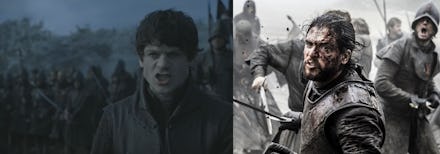The 'Battle of the Bastards' Proved One Bastard Wasn't as Clever as He Thought

(Editor's note: This post is dark and full of spoilers from Game of Thrones season six)
Last night's Game of Thrones episode, "Battle of the Bastards," boasted two gigantic battle scenes. But the latter, between the resurrected Jon Snow and newly declared Warden of the North Ramsay Bolton, easily stole the episode as the show's biggest action sequence to date — and perhaps in TV history.
While no one expected Ramsay, whose villainy has been exhaustively established over the course of the show, to walk away victorious, this wasn't Snow's triumph.
Westeros' worst person ever only has himself to blame. The patricidal sociopath may be many things, but a good commander is not one of them.
The Battle of the Bastards should have been a much easier fight for the Bolton army. Snow had just 2,400 men-at-arms, consisting of 2,000 wildlings and just over 400 troops from other Northern houses — while his opponent commanded 6,000 troops including 5,000 Bolton soldiers. Bolton's troops possessed superior equipment to the wildlings, including a much larger contingent of archers, Smalljon Umber's infantry and considerably more cavalry. They were also presumably much better provisioned than Snow's ragtag army — which had no lords or holdings to supply it.
But Ramsay squandered his most valuable asset as a field commander: Winterfell. His own late father, Roose Bolton — a much more accomplished tactician — even issued his son an explicit warning earlier on about making this kind of mistake in the season 5 episode "Hardhome."
"Our walls have been fully repaired," the elder Bolton counsels his son. "The gates have been reinforced. We have enough food for six months. We are more prepared for a siege than they could ever be. All we have to do is wait for them to freeze, starve and mutiny."
Ramsay responds, "I think you're missing an opportunity to show the people of the North how House Bolton treats Southron invaders ... We hit first, we hit hard — and leave a feast for the crows."
"A smart commander does not abandon a defensive advantage," his father shoots back. "As long as we stay behind these walls, they can't touch us."
Ramsay won that battle — but only because Stannis, who set out with an army of thousands, saw his forces dwindle to just over 1,000 half-frozen and starved men via desertion, cold, disease and Bolton sabotage. The Baratheon forces never had a chance.
Snow was a stronger opponent. But not only did Ramsay choose to sally forth with his forces instead of luring the other bastard into a disastrous siege, he met Snow on a field of battle beyond the range of the defensive fortifications, which could have amplified his already potent advantages.
"Ramsay Bolton would have been better to stay behind the walls of his fortification," says Loyola University Maryland medieval war historian Kelly DeVries, who noted the attackers were ill-equipped for any kind of assault. "There would never have been a concerted siege effort like we saw with the siege of the Blackfish and so forth."
Still, the tide of battle was looking good for Bolton. After luring the opposing army into a charge against superior odds — using Rickon as bait — Snow's original plan to feign a retreat and draw out the battle was ruined, just as his sister Sansa Stark warned would happen.
"Sansa's pretty accurate in suggesting that you can't trick a trickster," DeVries quipped.
But Bolton's shortsightedness and bloodlust again worked against him. After meeting the charge with his own cavalry, Bolton viciously fired on his own men:
This, according to DeVries, would have been considered an atrocity in medieval times.
"We absolutely have no single example of someone shooting into their own troops" in that time period, DeVries says. "It just would not have happened. Everyone valued the life of a soldier too much ... [This tactic] is far more evil than anybody we could encounter in the Middle Ages."
Even Snow's most desperate moment — the devastating encirclement of his forces by the Bolton army — might have been a tactically short-sighted move by Ramsay. Military theorist Sun Tzu argued a commander should allow an encircled army a route of escape, as it would send the opponent's forces into a panicked rout rather than a prolonged fight to the death. Bolton's desire to drag out his opponents' suffering and cause a complete annihilation came at a significant cost to his own forces.
Finally, Littlefinger's surprise entry to the battle with the knights of the Vale could be attributed to the Bolton bastard's disastrous incompetence as much as Sansa's cleverness.
"Most commanders would have posted scouts and had some awareness, some intelligence that a large force are advancing on them," said DeVries. "That doesn't happen as often, the absolute surprise of large forces doesn't happen."
"Ramsay was terrible at it," he continued. "We don't have a lot of indications of his military capabilities before ... whereas Jon Snow led troops many times before in battle."
"Ramsay, once on the battlefield, he's like many generals throughout time, who are so cocky about their abilities and their forces' abilities and their numbers that they cause some terrible defeats on the battlefield," DeVries added, comparing the Bolton force's destruction to the French defeat at Agincourt in 1415 and the Turkish victory over European crusaders at Nicopolis in 1396. "They play into the opposing generals' game and pull defeat out of the jaws of victory."
As Roose put it earlier in this season: "If you acquire a reputation as a mad dog, you will be treated as a mad dog. Taken out back and slaughtered for pig feed."
Or, you know, dog chow.
Read more: